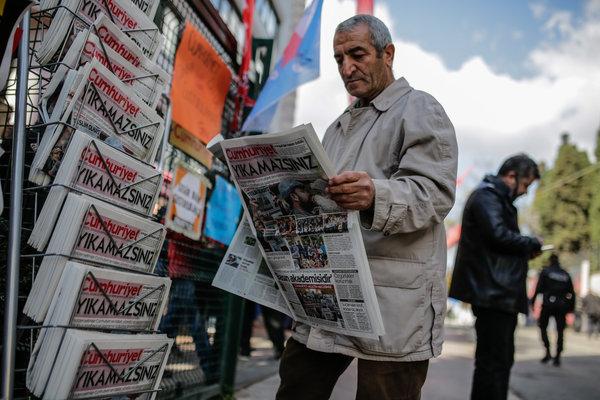Parties and authoritarian states are used to it. But how the EU candidate Turkey is now hindering international media is bizarre.
For more than two decades, the German journalist Thomas Seibert from Turkey has reported – in recent years also for the Press. But that’s over now. The Turkish authorities have refused to extend accreditation to the reputed reporter. Obviously, Seibert has not only made friends with his meticulous, to the point portrayals of the Turkish reality with the rulers in Ankara.
At the same time, he is the youngest victim of a game that the Turkish authorities have been doing with foreign media, especially since the coup attempt in 2016: they are setting an example for individual journalists, in the – false – hope of forcing such a friendlier reporting. According to the motto: If we can put pressure on our local journalists, we somehow manage to do that with the international ones.
They went so far as to temporarily throw the German “world” correspondent Deniz Yücel and the Austrian journalist Max Zirngast for alleged terrorist charges in prison. Although the Austrian Zirngast is free, he still can not leave Turkey.
By saying that one is a “terrorist sympathizer”, one is now very quickly confronted in Turkey as a journalist. It is sufficient to report from northern Syria the struggle of the Kurds against the so-called Islamic State (IS). The Kurdish forces there are allied with the US but are also considered a sister movement of the PKK, which leads an underground war in Turkey.
In Turkish justice, this approach is defended by the guideline: “He who reports of terrorists is himself a terrorist.” This argument is certainly bizarre. Because to report on someone or to interview someone does not mean that they approve of their actions or even pursue the same goals. Israeli correspondents from international media also repeatedly reported from the Hamas-controlled Gaza Strip. And the German author Jürgen Todenhöfer even managed to travel to the “caliphate” of the IS at the end of 2014 and to write a book about it. But nobody ever arrested them – and of course quite rightly so.
Similar problems as the Turkish make the Egyptian state power: There is also international reporters the contact with representatives of the once-ruling and now crowded into the underground Muslim Brotherhood is prohibited.
Highly questionable access to media freedom is also shown by the authorities of Ukraine: they refuse entry to the ORF correspondent Christian Wehrschütz and accuse him of, among other things, “anti-Ukrainian propaganda”. This not only testifies to an absurd notion of what the media has to do with, but also to the attitude, “Those who are not one hundred percent for us are against us.” An attitude of mind that suggests enemies and traitors everywhere.
Reporting from authoritarian states and crisis areas has always been extremely difficult for foreign reporters. Already during the wars in the former Yugoslavia, one could quickly be “punished” by one of the parties for persona non grata and with serious problems with the issuing of entry visas.
This is no different in today’s crisis areas. The acting actors have even become “unsportsmanlike”. In countries like Syria, playing with (not) issuing entry visas is the same. If one has visited one of the warring parties, one does not have to look at the other one anymore. But this prevents exactly what good crisis journalism should do: reporting on all sides of a complex conflict.
Turkey is not war-torn Syria. The country is – officially – still an EU candidate country. But the government in Ankara has gone further and further away from this path. Now more and more in behavior towards international media.

